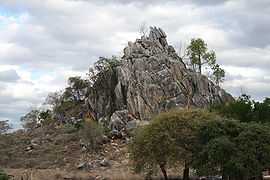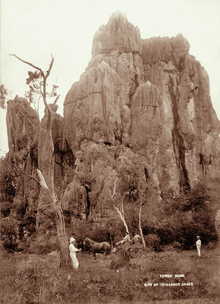Chillagoe, Queensland
| Chillagoe Queensland | |
|---|---|
 | |
 Chillagoe | |
| Coordinates | 17°09′S 144°31′E / 17.150°S 144.517°ECoordinates: 17°09′S 144°31′E / 17.150°S 144.517°E |
| Population | 227 (2006 census)[1] |
| Postcode(s) | 4871 |
| Location |
|
| LGA(s) | Shire of Mareeba |
| State electorate(s) | Cook |
| Federal Division(s) | Kennedy |
Chillagoe in northern Queensland, Australia, was once a thriving mining town for a range of minerals,[2] but is now reduced to a small zinc mine and some marble quarries. It is within the local government area of Shire of Mareeba (between 2008 and 2013, it was within the Tablelands Region). At the 2006 census, Chillagoe had a population of 227.[1]
Just out of town is the Chillagoe-Mungana Caves National Park containing limestone caves. There are between 600 and 1,000 caves in the Chillagoe-Mungana area. The caves, the spectacular karst landscape and the mining and smelting history are the main tourist attractions to the region.
It has been stated by leading geologist Professor Ian Plimer that the Chillagoe region has the most diverse geology in the world.
History
Chillagoe was named by William Atherton in 1888. The name is taken from the refrain of a sea shanty: "Hikey, Tikey, Psyche, Crikey, Chillagoe, Walabadorie".[3] James Mulligan had explored the area in 1873 and Atherton backed up his reports of rich copper outcrops in the area. Mining pioneer John Moffat sent prospectors to the field in 1888 and quickly monopolised the field. A receiving office opened in 1891 (with W. Atherton as Receiving Office Keeper) but closed in 1893. A post office opened in 1900 with F. Donner as the storekeeper and postmaster. The Chillagoe Railway and Mining Company's line opened from Mareeba in 1901 and a Town Reserve was proclaimed 27 October 1910.[4]

Chillagoe is sometimes remembered for its involvement in the Mungana affair, a mining scandal which brought down the government. In 1919, after fluctuating fortunes and closures, ownership of the smelter was transferred to the Queensland Government. This acquisition by the Labor Government brought allegations of political corruption which persisted for many years. Closures plagued the smelter again in the late 1920s. When the Australian Labor Party lost power in 1929, the new government ordered a Royal Commission into the incident. The political careers of two former Queensland Premiers, 'Red' Ted Theodore and William McCormack, were ruined by the Commission’s report. Read the famous book by Frank Hardy: "Power without Glory".
Woothakata is a property on beautiful Chillagoe creek named after the early Tableland shire which Chillagoe was a part of. Woothakata is an Aboriginal word which describes the way Aborigines traveled to Ngarrabullgan/Mount Mulligan, an important meeting place.
The heritage-listed Chillagoe smelters, the cemetery and the many old mines attract history buffs to the area.
Heritage listings
Chillagoe has a number of heritage-listed sites, including:
- Kitoba Holding: OK Mine & Smelter[5]
- Mareeba Mining District: Chillagoe smelters[6]
- Mungana: Mungana Archaeological Area[7]
- Tate-Almaden Road: Fischerton Water Race[8]
References
- ↑ 1.0 1.1 Australian Bureau of Statistics (25 October 2007). "Chillagoe (L) (Urban Centre/Locality)". 2006 Census QuickStats. Retrieved 2007-01-27.
- ↑ The Chillagoe Railway and Mining Company Ellis, R.F. Australian Railway Historical Society Bulletin December 1976; January–April, 1977 pp 270-291; 16-23; 36-48; 62-81
- ↑ Bolton, G.C. (1975) A Thousand Miles Away: A History of North Queensland to 1920, Australian National University Press, ISBN 0-7081-0091-0
- ↑ Frew, Joan (1981) Queensland Post Offices 1842-1980 and Receiving Offices 1869-1927, p. 235. Fortitude Valley, Queensland: published by the author, ISBN 0-9593973-0-2
- ↑ "OK Mine & Smelter (entry 16126)". Queensland Heritage Register. Queensland Heritage Council. Retrieved 2013-07-14.
- ↑ "Chillagoe Smelters (entry 15450)". Queensland Heritage Register. Queensland Heritage Council. Retrieved 2013-07-14.
- ↑ "Mungana Archaeological Area (entry 30338)". Queensland Heritage Register. Queensland Heritage Council. Retrieved 2013-07-14.
- ↑ "Fischerton Water Race (entry 16596)". Queensland Heritage Register. Queensland Heritage Council. Retrieved 2013-07-14.